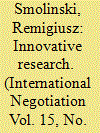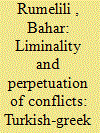| Srl | Item |
| 1 |
ID:
052206


|
|
|
| 2 |
ID:
078686


|
|
|
|
|
| Publication |
2007.
|
| Summary/Abstract |
Conflicts between European Union (EU) members about enlargement result from its redistributive effects. EU members are more likely to suffer from enlargement if they profit from EU transfers and if they are relatively close to applicant countries in which unemployment is significantly higher than in member countries. Phasing in membership rights serves to compensate the relative losers of enlargement to accomplish EU widening. Using data from all previous enlargement rounds until 2004, we demonstrate that EU members are more likely to demand a discrimination of new members if distributional conflicts arise. The existence of these distributional conflicts in turn increases the odds of EU members and the accession candidates actually agreeing on a phase-in period.
|
|
|
|
|
|
|
|
|
|
|
|
|
|
|
|
| 3 |
ID:
084425


|
|
|
|
|
| Publication |
2008.
|
| Summary/Abstract |
Despite the political and economic importance of the fifth European Union enlargement, not much research has been devoted to the negotiation process that led to this event. The purpose of this paper is to present the results of our survey conducted among politicians and diplomats representing the parties in the accession negotiations. The main objectives of this survey were to identify differences between the negotiating behavior and attitudes of participants and examine differences between the perceptions (self-perception vs. the perception of the negotiation partners) of the negotiating profiles. From the survey data, we gain valuable insights into the negotiation process, particularly into the parties' perceptions of selected traits, such as attitudes, interests, power, climate, team organization, communication, concern for protocol, flexibility, emotion, and time sensitivity, among negotiating profiles.
|
|
|
|
|
|
|
|
|
|
|
|
|
|
|
|
| 4 |
ID:
099820


|
|
|
|
|
| Publication |
2010.
|
| Summary/Abstract |
An alternative method of capturing negotiating attitudes and behavior in international negotiation employs the concept of negotiating profiles and a way of measuring and mapping it. We apply this method in a survey of politicians and diplomats who participated in the EU enlargement negotiations. From the survey results, we selected and analyzed negotiating profiles of Malta, the Czech Republic, Poland, Estonia and Slovenia. The results of our analysis allow us to draw cautious conclusions concerning the most and the least favorable attitudes and behaviors in international negotiations on the highest levels.
|
|
|
|
|
|
|
|
|
|
|
|
|
|
|
|
| 5 |
ID:
055789


|
|
|
| 6 |
ID:
064647


|
|
|